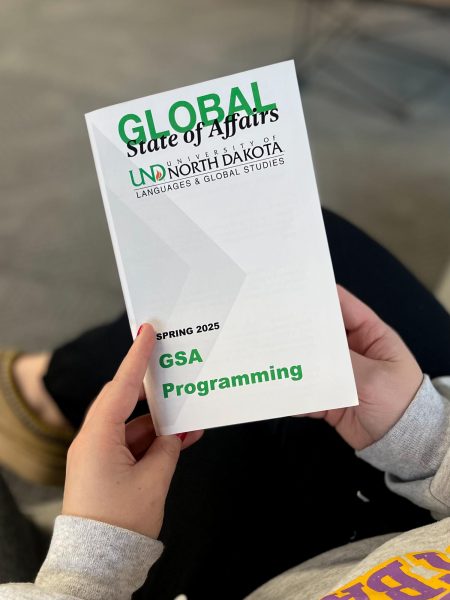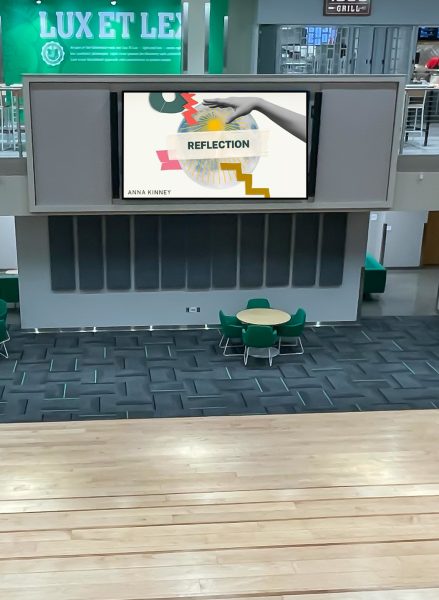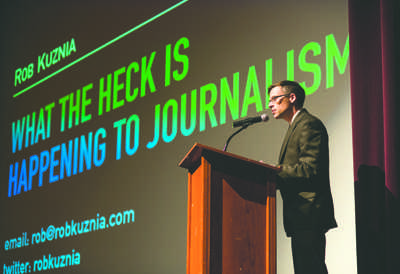Economics professor retiring after 26 years
Fathollah Bagheri, professor of economics at UND, is set to retire at the end of this academic year. He has taught at the university since 1990.
Bagheri was born in Taft, Iran. His father was a businessman, and his mother stayed home to care for Bagheri and his six siblings.
Bagheri attended a small private elementary school, and this is where he had his first teaching experience. The school was run by one man, who acted as principal, administrator and teacher for all grades.
Because Bagheri was recognized as the top student in his fourth-grade class, he was asked to assist the principal, grading math and dictation homework for the younger students. At the end of the semester it was his job to assist the principal in preparing students’ transcripts by entering the scores and calculating the averages by hand.
After high school, Bagheri attended Pahlavi University in Shiraz, Iran. He worked hard and was again recognized as a top student, an achievement that resulted in a scholarship to the University of Pennsylvania under the condition that he would return to work in Shiraz.
Bagheri admits that his first years at the Ivy League school were difficult. He didn’t give up, and after spending six and a half years at the university and two years writing his dissertation, he received a doctorate in economics in 1978.
Bagheri’s work earned him the William Polk Carey Prize in Economics for the best dissertation of the year.
During his studies, Bagheri taught classes at Villanova University, Drexel University and Temple University.
He was offered several teaching jobs and a position at the World Bank in Washington, D.C., but because he had a commitment in Shiraz, he returned to teach in Iran.
Nine months after his return, the Iranian Revolution resulted in the fall of the shah’s regime. The shah — the name for Iran’s king — at the time was Shah Mohammad Reza Pahlavi, for whom Pahlavi University was named. With the establishment of the Islamic Republic of Iran, the university’s name was changed to Shiraz University.
Along with the name change and after teaching at the graduate and undergraduate levels, Bagheri said his role at the university changed when he was asked to assume an administrative position. He became the vice president for personnel and financial affairs for the more than 600 faculty members and 15,000 students.
This was a difficult time in Iran, which had been invaded by Iraq. The institution faced a budget shortfall. Many of the war’s casualties were taken to the university’s five hospitals, which lacked funding for medicine and other necessities.
“It was a disaster,” Bagheri said. “I was in charge of all those issues.”
After three years in that position, Bagheri went on a sabbatical to the U.S., where he began teaching at the University of Pennsylvania. He also taught classes at Drexel and Temple University to earn extra money for his young family.
After four years of teaching at Penn, Bagheri and his wife, Fatima, decided they wanted to live somewhere safer than Philadelphia to raise their children. He applied to several universities, and the first one to accept was UND.
Bagheri’s friends warned him not to move to North Dakota. They said it was too cold. They said it was the middle of nowhere.
“Many people told me, ‘You are making a mistake by moving from Penn to North Dakota,’” Bagheri said. “They said, ‘You can go from Penn to anywhere, but you can’t go from North Dakota to anywhere.’”
Bagheri didn’t listen, and in 1990 he started teaching at UND. He said he has never regretted the decision.
“More than anything else, I like the people,” Bagheri said. “The culture of the people in North Dakota is pretty much close to Iranian culture. People care about each other and help each other.”
Bagheri said he appreciates the kindness and generosity of his neighbors. Bagheri is admittedly not very handy around the house, but when a problem arises he only needs to call his neighbor and he’ll be over within five minutes to help.
And Bagheri’s neighbors aren’t limited to those who live next door.
During his first winters in Grand Forks, Bagheri got his vehicle stuck in the snow three times. He said on every occasion, the first person to drive by stopped to help. Another time, someone stopped when his vehicle was broken down on the side of the road.
“This is the kind of community I love to live in,” Bagheri said. “If we can promote these kinds of attitudes globally, then the whole world will be at peace.”
At UND, Bagheri was the director of international programs for the College of Business & Public Administration for 10 years. In that time, he helped develop a course called Applied Elements of Export Management, which brings in business leaders to teach students about the practical side of export.
He also directed a program known as Profiles in Entrepreneurship: North American Models of Innovation, Creativity and Entrepreneurship that allowed for student exchanges between the U.S., Canada and Mexico. Other projects of his include exchange programs with universities in France and China.
Bagheri uses his international experiences to teach global economic development courses.
“I have been to many, many countries, and I have a lot of observations that are very educational,” he said. “I see that eyes are open, everyone’s listening,” when he talks about his experiences in developing countries.
He also makes it a point to repeat himself during lectures, especially at the beginning, going over what was covered in the previous lecture. He also asks his students questions to make sure they are with him, but he doesn’t get upset when they don’t know the answers.
“If they know all the answers, they shouldn’t be here, because they know all the answers already,” Bagheri said.
As his final year of teaching at UND comes to an end, Bagheri and his wife are planning to move to California to be closer to their three children and five grandchildren.
Bagheri said he’ll miss his students and Grand Forks, a place he considers his home, but he won’t miss the winters.










